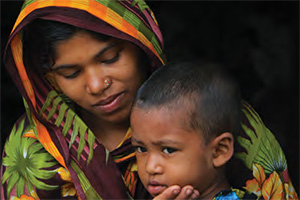Sustainability
- Home
- Locations
- What you can do
- LiFE Framework
- Sustainable Development Goals
- About us
- Grants
- Events
- Contact us
Now searching for:

Researchers from Charles Sturt University collaborated to identify factors driving vaccination rates of children in Bangladesh.
Charles Sturt’s Dr Azizur Rahman collaborated with researchers from Newcastle University (UK), Jahangirnaga University (Bangladesh), the Bangladesh Bank, Islami Bank Hospital (Bangladesh) and the University of British Columbia to investigate vaccination rates among children in Bangladesh between 1992 and 2014.
The World Health Organization (WHO) made the immunisation of children in developing countries a priority of its Expanded Program of Immunisation (EPI) to prevent childhood morbidities and mortalities. Despite these efforts, Bangladesh was still included in the top ten countries with the highest childhood mortality globally.
The research examined historical data from the Bangladesh Demographic Health Survey to identify factors contributing to vaccine coverage. The study found that factors such as administration region, mother’s level of education and socio-economic conditions affected a child’s vaccination status.